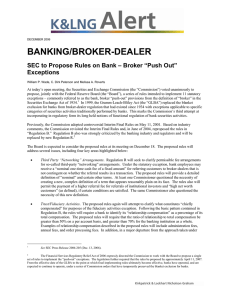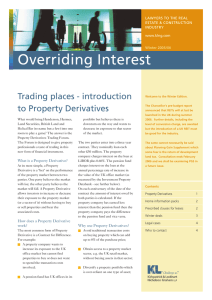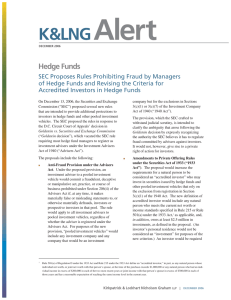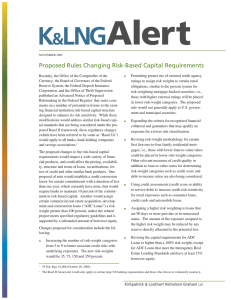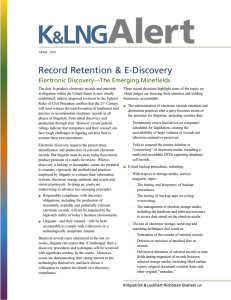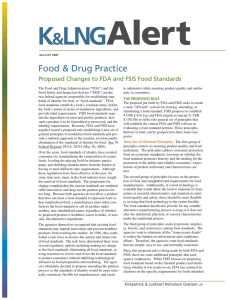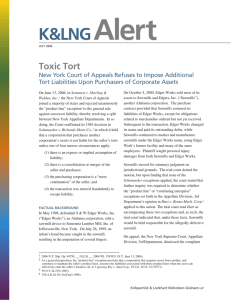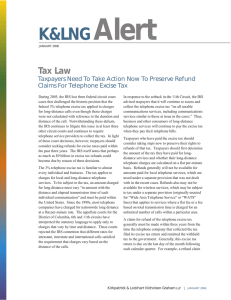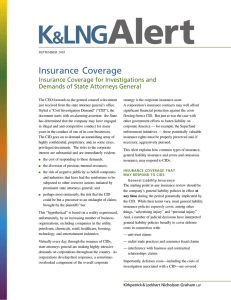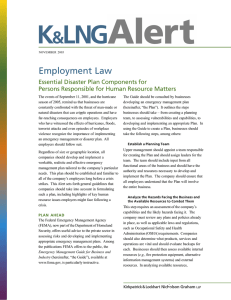Real Estate United States: Private Development Through Eminent Domain May Be Permissible
advertisement
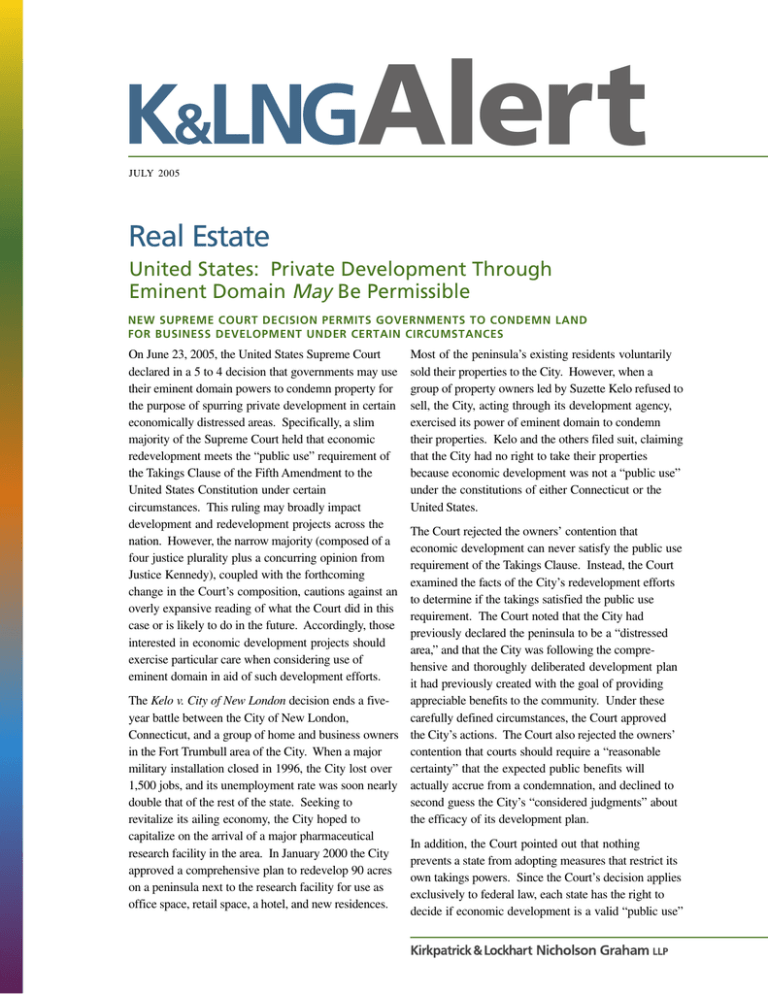
JULY 2005 Real Estate United States: Private Development Through Eminent Domain May Be Permissible NEW SUPREME COURT DECISION PERMITS GOVERNMENTS TO CONDEMN LAND FOR BUSINESS DEVELOPMENT UNDER CERTAIN CIRCUMSTANCES On June 23, 2005, the United States Supreme Court declared in a 5 to 4 decision that governments may use their eminent domain powers to condemn property for the purpose of spurring private development in certain economically distressed areas. Specifically, a slim majority of the Supreme Court held that economic redevelopment meets the “public use” requirement of the Takings Clause of the Fifth Amendment to the United States Constitution under certain circumstances. This ruling may broadly impact development and redevelopment projects across the nation. However, the narrow majority (composed of a four justice plurality plus a concurring opinion from Justice Kennedy), coupled with the forthcoming change in the Court’s composition, cautions against an overly expansive reading of what the Court did in this case or is likely to do in the future. Accordingly, those interested in economic development projects should exercise particular care when considering use of eminent domain in aid of such development efforts. Most of the peninsula’s existing residents voluntarily sold their properties to the City. However, when a group of property owners led by Suzette Kelo refused to sell, the City, acting through its development agency, exercised its power of eminent domain to condemn their properties. Kelo and the others filed suit, claiming that the City had no right to take their properties because economic development was not a “public use” under the constitutions of either Connecticut or the United States. The Court rejected the owners’ contention that economic development can never satisfy the public use requirement of the Takings Clause. Instead, the Court examined the facts of the City’s redevelopment efforts to determine if the takings satisfied the public use requirement. The Court noted that the City had previously declared the peninsula to be a “distressed area,” and that the City was following the comprehensive and thoroughly deliberated development plan it had previously created with the goal of providing The Kelo v. City of New London decision ends a fiveappreciable benefits to the community. Under these year battle between the City of New London, carefully defined circumstances, the Court approved Connecticut, and a group of home and business owners the City’s actions. The Court also rejected the owners’ in the Fort Trumbull area of the City. When a major contention that courts should require a “reasonable military installation closed in 1996, the City lost over certainty” that the expected public benefits will 1,500 jobs, and its unemployment rate was soon nearly actually accrue from a condemnation, and declined to double that of the rest of the state. Seeking to second guess the City’s “considered judgments” about revitalize its ailing economy, the City hoped to the efficacy of its development plan. capitalize on the arrival of a major pharmaceutical In addition, the Court pointed out that nothing research facility in the area. In January 2000 the City prevents a state from adopting measures that restrict its approved a comprehensive plan to redevelop 90 acres own takings powers. Since the Court’s decision applies on a peninsula next to the research facility for use as exclusively to federal law, each state has the right to office space, retail space, a hotel, and new residences. decide if economic development is a valid “public use” under its own state constitution. Therefore, each state may have requirements that differ from the federal condemnation provisions. In fact, some states have already begun making changes to their own laws that may limit the effect of the new ruling. criticism and challenge in recent years. The Court’s holding regarding public use and its deference to the judgment of elected officials may provide new life to these efforts and opportunities for private developers, but changes to the Court on the near horizon merit a close watch and judicious use of the eminent domain While the majority of the Court approved of New power. Because of the changes the Kelo decision has London’s use of eminent domain in this particular made in federal law and the changes it may create in situation—where the economic distress of the state law, the new constitutional ruling could have a community and the rationale behind the development significant impact on government’s willingness and project were well documented—the majority, ability to promote economic development by exercise concurring, and dissenting opinions of the divided of its power of condemnation. Given the intricate Court underscore the need for a careful reading and a legal questions involved in condemnation actions and cautious approach. The fifth concurring vote from questions of “public use,” developers, governmental Justice Kennedy came with a cautionary separate agencies, and others interested in redevelopment opinion, warning that closer scrutiny might be given to projects should contact us to discuss how the new situations where there is a plausible accusation of ruling might impact any individual situations. impermissible favoritism to private parties. Moreover, with the retirement of Justice O’Connor and other possible changes to the Court’s composition, the Blaine A. Lamperski R. Timothy Weston membership of the Court may become more blamperski@klng.com tweston@klng.com conservative. As signaled by the four dissenting 412.355.8309 717.231.4504 Justices in Kelo, the Court’s current conservative wing Pierce Richardson Mark D. Mako is significantly more hostile to finding “public use” prichardson@klng.com mmako@klng.com where a development involves taking of private 412.355.6786 973.848.4037 property for redevelopment by private entities. Local government use of condemnation to assist redevelopment efforts has been subject to increased The authors wish to thank summer associate Justin Earley for his assistance with this Alert. FOR MORE INFORMATION on this Alert or other real estate issues, please feel free to contact one of the Kirkpatrick & Lockhart Nicholson Graham LLP lawyers listed below. Paul C. Bauer Julie E. Lennon R Timothy Weston P. Wayne Smith William J. Bernfeld Daniel A. Casey John M. Marmora Jeffrey H. Weitzman Deborah Bailey-Wells David H. Ehrenwerth Jonathan M. Cohen Thomas F. Cooney, III Boston Dallas Harrisburg London Los Angeles Miami Newark New York Palo Alto Pittsburgh San Francisco Washington 617.951.9247 214.939.4920 717.231.4504 +44.(0)20.7360.8201 310.552.5014 305.539.3324 973.848.4016 212.536.3956 415.249.1065 412.355.6532 415.249.1029 202.778.9076 pbauer@klng.com jlennon@klng.com tweston@klng.com wsmith@klng.com wbernfeld@klng.com dcasey@klng.com jmarmora@klng.com jweitzman@klng.com dbaileywells@klng.com dehrenwerth@klng.com jcohen@klng.com tcooney@klng.com www w.. k l n g . c o m BOSTON DALLAS HARRISBURG LONDON LOS ANGELES MIAMI NEWARK NEW YORK PALO ALTO PITTSBURGH SAN FRANCISCO WASHINGTON ■ ■ ■ ■ ■ ■ ■ ■ ■ ■ ■ Kirkpatrick & Lockhart Nicholson Graham LLP (K&LNG) has approximately 950 lawyers and represents entrepreneurs, growth and middle market companies, capital markets participants, and leading FORTUNE 100 and FTSE 100 global corporations nationally and internationally. K&LNG is a combination of two limited liability partnerships, each named Kirkpatrick & Lockhart Nicholson Graham LLP, one qualified in Delaware, U.S.A. and practicing from offices in Boston, Dallas, Harrisburg, Los Angeles, Miami, Newark, New York, Palo Alto, Pittsburgh, San Francisco and Washington and one incorporated in England practicing from the London office. This publication/newsletter is for informational purposes and does not contain or convey legal advice. The information herein should not be used or relied upon in regard to any particular facts or circumstances without first consulting a lawyer. Data Protection Act 1988 - We may contact you from time to time with information on Kirkpatrick & Lockhart Nicholson Graham LLP seminars and with our regular newsletters, which may be of interest to you. We will not provide your details to any third parties. Please e-mail cgregory@klng.com if you would prefer not to receive this information. © 2005 KIRKPATRICK & LOCKHART NICHOLSON GRAHAM LLP. ALL RIGHTS RESERVED.


